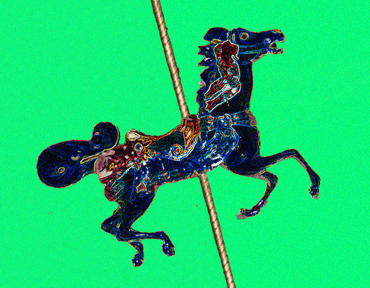

|
|
The
Painted Ponies: |
Katie Amatruda PsyD, MFT, CST-T, BCETS
This course meets the qualifications for 5 hours of continuing education

Eva is 43 years old, has been hospitalized numerous times and made many suicide attempts. Her father was bipolar (or manic-depressive) and committed suicide when he was in his sixties. Eva refuses to take her medication.
This course will follow the treatment of Eva and her family and look at how the assessment of bipolar disorder was made.
Alan is a successful attorney, aged 57, who enjoys adventures in nature. Recently he had been prescribed quinacrine for a parasite he had picked up in the rain forest. Within two weeks of taking the recommended dosage, Alan was having a complete manic episode, with religious ideation, racing thoughts, grandiosity, and insomnia. Alan was brought to the local hospital, where he was diagnosed with bipolar disorder.
Kerry. age 16, came to therapy, irate with her mother. "She never listens to me! She never gives me any freedom. One minute she's real nice, then she is screaming at me, and grounding me. I think my mother is bipolar!"
There is no doubt that the diagnosis of bipolar disorder is very common today. People who in the 'old days' (10 years ago) were considered normal mothers of teenagers, or borderlines, or having ADD, or of having a bad reaction to a medication, are now considered bipolar. It is our job as therapists to become educated about what bipolar disorder looks and feels like, so that we can educate our patients, their families, and, at times, their physicians and psychiatrists as to the differential diagnosis involved in bipolar disorder.
We will explore how bipolar disorder impacts the lives of adults with this illness, as well as their families.
Different treatment options based upon the client, such as play therapy, supportive therapy, family therapy, psychoeducation, medication will be discussed.
Differential diagnosis, medication, heredity, countertransference , nature and nurture, body and soul and the importance of acknowledging the wholeness in each other will be explored in the cases presented and in the links.
This course meets the qualifications for 5 hours of continuing education
maintains responsibility for the program. |
Learning Objectives:
This course will allow the student to:
1.
recognize the symptoms involved in the Bipolar Disorder diagnosis.
2.
identify the concepts of diagnosis and treatment of bipolar
disorder in adult populations.
3.
know the difference between bipolar disorder and other illnesses; be able
to complete a differential diagnosis.
4.
understand the concept of bipolar disorder as a life long condition
necessitating psychotherapy, medication and psychoeducation.
5.
explore countertransference issues regarding bipolar disorder;
6.
understand the high risk of suicide in people with bipolar disorder.
7. understand and choose between different treatment options based upon the client (play therapy, supportive therapy, family therapy, psychoeducation, medication, etc.).
888-777-3773
|
|